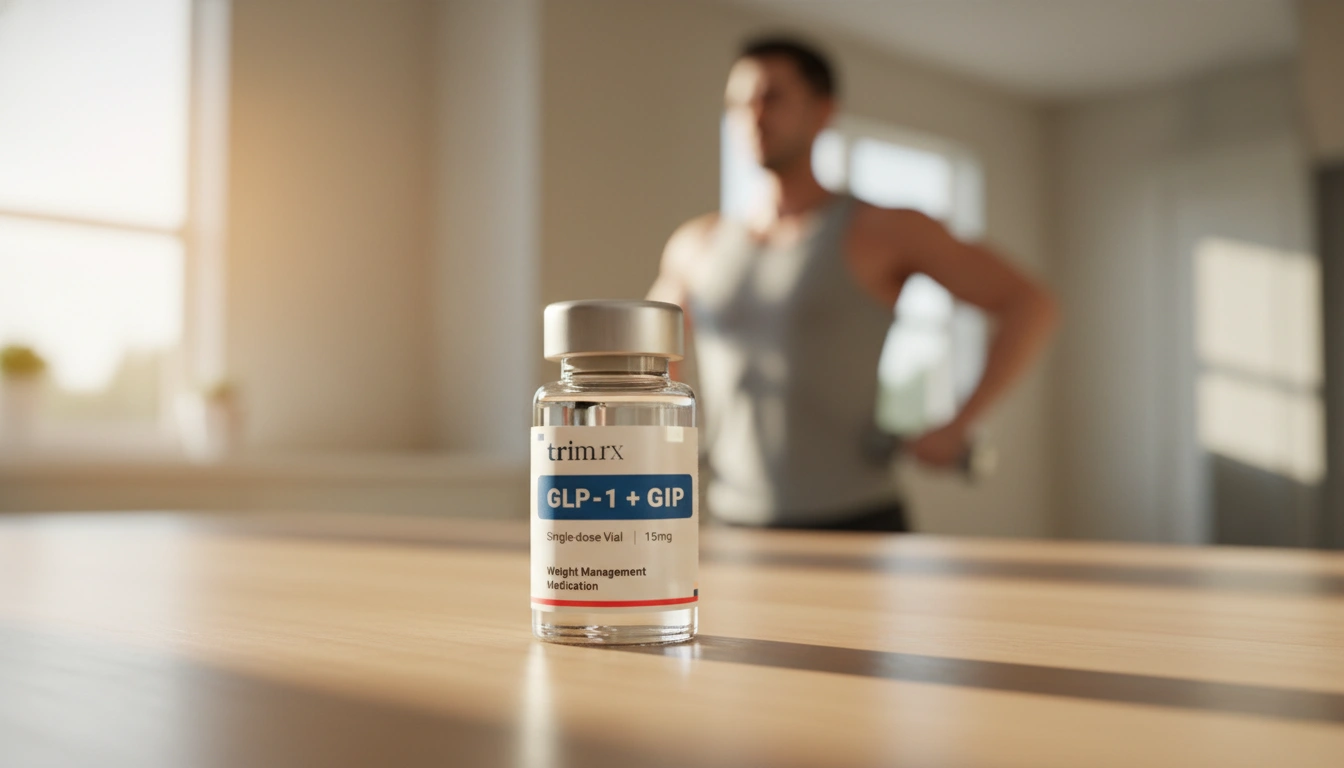When to Stop Increasing GLP-1: A Comprehensive Guide to GLP-1 Therapy Management

Introduction
Did you know that nearly 50-75% of people who start taking GLP-1 medications for weight management stop using them within a year? This staggering statistic highlights a crucial juncture in the journey of individuals managing their weight with these innovative therapies. As we dive into the world of GLP-1 medications like Semaglutide and Tirzepatide, it’s essential to understand not only their benefits but also the critical question of when to stop increasing doses and how to manage therapy effectively.
At TrimRx, our mission is to empower individuals on their weight loss journeys through personalized, medically supervised care. We believe that understanding the nuances of GLP-1 therapies is vital for achieving sustainable weight loss. In this blog post, we will unravel the complexities surrounding GLP-1 medications, discussing why individuals might consider tapering their dosage and the implications of such decisions.
Throughout this article, we will cover:
- The role of GLP-1 medications in weight loss
- When to consider stopping or adjusting GLP-1 therapy
- The importance of lifestyle modifications alongside medication
- The potential consequences of discontinuing GLP-1 medication
- How TrimRx can support you in your weight loss journey
By the end of this blog post, you’ll have a comprehensive understanding of the factors influencing GLP-1 medication management, empowering you to make informed decisions about your health. Let’s explore this fascinating topic together.
Understanding GLP-1 Medications
Before diving into the specifics of dosage management, it’s essential to understand what GLP-1 (Glucagon-Like Peptide-1) medications are and how they function. GLP-1 medications, including Semaglutide (Ozempic, Wegovy) and Tirzepatide (Mounjaro), are a class of drugs designed to assist with weight management and glycemic control in individuals with obesity or type 2 diabetes.
Mechanism of Action
GLP-1 medications mimic the action of the naturally occurring hormone GLP-1, which is released in the gut after eating. They work by:
- Enhancing Satiety: GLP-1 medications help you feel fuller for longer, reducing hunger and the likelihood of overeating.
- Slowing Gastric Emptying: By delaying the emptying of food from the stomach, these medications prolong the feeling of fullness.
- Modulating Glucose Levels: They promote insulin secretion in response to meals while inhibiting glucagon release, ultimately helping to regulate blood sugar levels.
Clinical studies have shown that individuals using GLP-1 medications can achieve significant weight loss, often in the range of 15-20% of their body weight. However, like any medication, there comes a point where dosage adjustments might be necessary based on individual circumstances.
The Importance of Personalized Treatment
At TrimRx, we firmly believe that effective weight loss solutions must be personalized to fit each individual’s unique needs, metabolic profile, and lifestyle. This is why we offer a free assessment quiz that helps us create customized treatment plans for our clients. If you’re considering GLP-1 medications, we invite you to take our free assessment quiz to see if you’re eligible for our prescription weight loss medications.
When to Stop Increasing GLP-1 Dosage
Deciding when to stop increasing GLP-1 dosage is a crucial aspect of therapy management. While these medications can be incredibly effective, there are several factors to consider when determining whether to adjust your dosage or continue treatment at the same level.
1. Achievement of Weight Loss Goals
One of the primary reasons to consider stopping or adjusting GLP-1 medication dosage is the achievement of your weight loss goals. If you have reached your desired weight or significantly improved your health markers, it may be appropriate to evaluate whether a lower dosage or tapering off is suitable.
2. Plateauing in Weight Loss
Experiencing a plateau in weight loss is common among individuals using GLP-1 medications. Clinical observations indicate that after a certain point, the body may adapt to the medication, resulting in diminished returns on weight loss efforts. If you’ve been on a high dosage for an extended period without further weight loss, it may be time to consult with your healthcare provider about a possible tapering plan.
3. Side Effects and Tolerance
While GLP-1 medications are generally well-tolerated, some individuals may experience side effects such as nausea, vomiting, or gastrointestinal discomfort. If side effects become unmanageable or if you find that they outweigh the benefits of the medication, it may be time to discuss dosage adjustments with your healthcare provider.
4. Lifestyle Changes and Behavioral Adjustments
Many individuals find that lifestyle modifications, such as improved diet and increased physical activity, can significantly enhance weight loss results. If you have successfully implemented lasting changes to your diet and exercise routine, you might be able to maintain weight loss with a lower dosage of GLP-1 medication, or potentially taper off altogether.
5. Consultation with Healthcare Professionals
At TrimRx, we emphasize the importance of ongoing communication with our medical team. Regular consultations allow for proactive adjustments to your treatment plan based on your progress and any side effects you may encounter. Your healthcare provider can help you assess whether it’s time to stop increasing the dosage and explore alternative strategies for maintaining weight loss.
The Importance of Lifestyle Modifications
While GLP-1 medications can provide significant assistance in weight management, they are most effective when paired with sustainable lifestyle changes. At TrimRx, we advocate for a holistic approach to weight loss that includes:
- Balanced Nutrition: Focus on whole, nutrient-dense foods that support weight loss and overall health. This can include fruits, vegetables, lean proteins, and healthy fats.
- Regular Physical Activity: Incorporating regular exercise into your routine can enhance the effects of GLP-1 therapy. Aim for a combination of aerobic and resistance training to support muscle mass and metabolic health.
- Behavioral Support: Engaging in behavioral health support can help address emotional eating patterns and improve adherence to lifestyle changes. We offer resources to help you navigate this aspect of your journey.
Combining GLP-1 medications with personalized lifestyle adjustments can lead to more sustainable weight loss outcomes and improve your overall well-being.
Consequences of Discontinuing GLP-1 Therapy
Understanding the potential consequences of stopping GLP-1 therapy is essential for making informed decisions about your treatment plan. Research indicates that individuals who discontinue GLP-1 medications may experience rapid weight regain, often regaining a significant portion of the weight lost during therapy.
1. Weight Regain
The primary concern when stopping GLP-1 therapy is the likelihood of gaining back the weight that was lost. Studies show that many individuals regain two-thirds of their lost weight within a year of stopping the medication. This rapid regain can occur due to the body’s adaptive mechanisms, which often resensitize hunger signals and dysregulate appetite control.
2. Impact on Metabolic Health
Discontinuing GLP-1 medication can also impact metabolic health markers. Individuals may see a return to elevated blood sugar levels, increased insulin resistance, and a higher risk of cardiovascular events. It’s crucial to monitor these health indicators, even after stopping medication.
3. Psychological Effects
The emotional aspects of weight regain can also be profound. Individuals who have worked hard to lose weight may experience frustration, disappointment, or diminished self-esteem upon seeing their efforts reversed. It’s vital to have support systems in place to address these feelings and reinforce positive behaviors.
4. Need for Continuous Care
Given the chronic nature of obesity, many individuals may ultimately need to remain on GLP-1 therapy long-term to maintain their weight loss and health benefits. At TrimRx, we emphasize the importance of continuous care and support to help individuals navigate their weight loss journeys.
How TrimRx Can Support You
At TrimRx, we understand that each individual’s weight loss journey is unique. Our personalized approach to weight management combines advanced medical science with compassionate care to help you achieve your goals effectively and safely.
Personalized Assessment and Treatment Plans
Our free assessment quiz allows us to evaluate your specific needs and tailor a treatment plan that includes GLP-1 medications, lifestyle modifications, and ongoing support. We work with FDA-registered pharmacies to ensure your medications are safe and effective.
Ongoing Support
We provide unlimited support throughout your weight loss journey. Whether you have questions about medication management, need motivation to maintain your lifestyle changes, or require adjustments to your treatment plan, our dedicated team is here to help.
Comprehensive Care
Our comprehensive service includes doctor consultations, lab work, and medication management, ensuring you receive the holistic care needed for successful weight loss. We believe that safe and effective weight loss is achievable through a transparent and empathetic approach.
If you’re ready to explore personalized weight loss solutions, we encourage you to take our free assessment quiz today!
Conclusion
In conclusion, understanding when to stop increasing GLP-1 dosage is an essential aspect of managing your weight loss journey. While these medications offer significant benefits, a personalized approach that includes lifestyle modifications and ongoing support is crucial for sustained success.
At TrimRx, we are committed to empowering individuals to embrace healthier lifestyles through scientifically backed, personalized weight loss solutions. By understanding the factors influencing GLP-1 therapy management and maintaining open communication with healthcare providers, you can navigate your weight loss journey with confidence and clarity.
FAQ
Can I stop taking GLP-1 medications once I reach my weight loss goal?
While some individuals may consider tapering off after achieving their goals, it’s essential to consult with your healthcare provider. Stopping GLP-1 medications can lead to weight regain, so a comprehensive plan should be in place.
How do I know if I should decrease my GLP-1 dosage?
Regular consultations with your healthcare provider can help assess your progress. If you experience side effects, achieve your weight loss goals, or plateau, it may be time to discuss dosage adjustments.
What happens if I stop taking GLP-1 medications suddenly?
Discontinuing GLP-1 medications can lead to rapid weight regain and potential negative impacts on metabolic health. It’s crucial to have a plan in place, ideally with your healthcare provider’s guidance.
How can lifestyle changes support my GLP-1 therapy?
Incorporating balanced nutrition, regular physical activity, and behavioral support can enhance the effectiveness of GLP-1 medications and promote sustainable weight loss.
Can I take GLP-1 medications long-term?
Yes, many individuals may need to remain on GLP-1 therapy long-term to maintain weight loss and health benefits. Ongoing assessments and adjustments to your treatment plan can help ensure optimal outcomes.
By taking a proactive approach to your weight loss journey, you can navigate the complexities of GLP-1 therapy with confidence and support from TrimRx. Together, let’s work towards achieving your health and wellness goals!

Transforming Lives, One Step at a Time
Keep reading
Vitamin B12 and GLP-1 Medications: What to Know
GLP-1 medications can lower B12 absorption and intake; learn symptoms, food sources, supplement options, and how to monitor levels.
Semaglutide Injection Site Reactions: What To Know
Learn why semaglutide injections can cause redness, swelling or nodules, how to prevent and treat them, and when to seek medical care.
TrimRx vs Friday’s
Compare TrimRx and Friday’s telehealth GLP-1 weight-loss programs: pricing, medical support, coaching, delivery, and which fits your needs.



